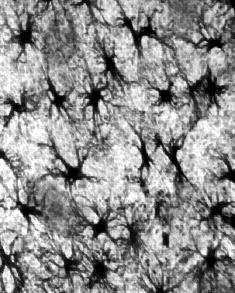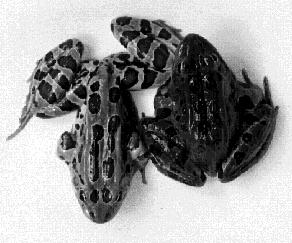
Melanocyte-stimulating hormone gets its name because of its effect on melanocytes: skin cells that contain the black pigment, melanin. In humans, melanocytes are responsible for moles, freckles, and suntan (and, if they turn cancerous, melanoma).
In most vertebrates, MSH is produced by an intermediate lobe of the pituitary gland. Its secretion causes a dramatic darkening of the skin of fishes, amphibians, and reptiles. The darkening occurs as granules of melanin spread through the branches of specialized melanocytes called melanophores.
The photomicrograph on the right shows melanophores in the skin of a frog with the melanin dispersed throughout the branches of the cells. This effect is produced by MSH. When the pigment retreats to the center of the cells, the skin lightens.
The photo below was taken a few moments after the frog on the right was injected with a small dose of MSH.
The response to MSH does not occur during mitosis; presumably the microtubules with their dyneins and kinesins are needed for operation of the mitotic spindle.
Proopiomelanocortin (POMC), the same precursor molecule from which the adrenocorticotropic hormone (ACTH) is synthesized, also produces two forms of MSH. One of them, α-MSH, is identical to the first 13 amino acids at the amino terminal of ACTH.

Researchers at the University of Arizona have shown that α-MSH can cause darkening of human skin. With FDA approval, they injected male volunteers with a synthetic version of α-MSH — which they called Melanotan I — to see if their skin darkened. It did, raising the possibility of using melanotan to get a suntan without the risks of exposure to ultraviolet light.
A second synthetic version of MSH — dubbed Melanotan II — also darkened the skin of male volunteers. Unexpectedly, it also caused many of them to develop penile erections. This has raised the possibility of using MSH to cure impotence.
Humans have no intermediate lobe in their pituitary gland, and MSH may not be a circulating hormone for us.
However, α-MSH is found in the brain where it acts to suppress appetite. Some cases of extreme obesity have been traced to mutations in the brain receptor for α-MSH. Presumably these people are unable to respond to the appetite-suppressing effect of their α-MSH.
| Welcome&Next Search |